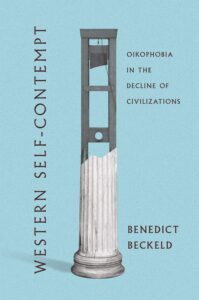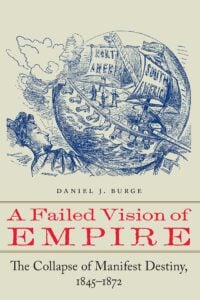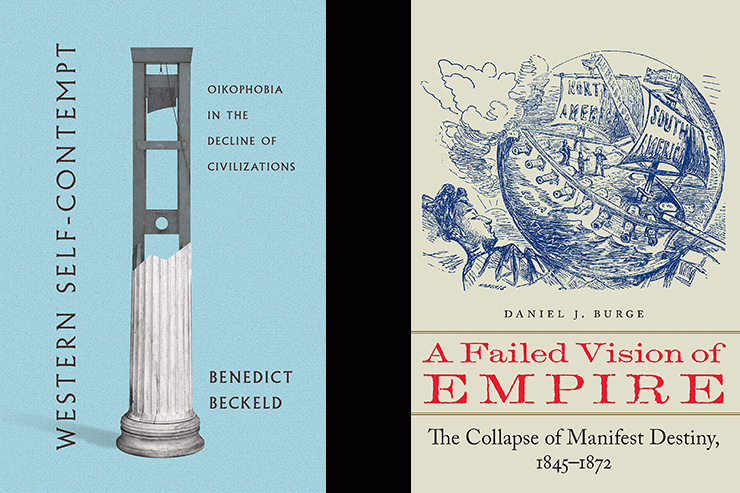
Western Self-Contempt: Oikophobia in the Decline of Civilizations, by Benedict Beckeld (Northern Illinois University Press; 264 pp., $32.95). In 1981, former Commerce Secretary Malcolm Baldrige accused corporate executives of being “too fat, dumb, and happy in the last 10 years.” Were Baldrige to make that speech today, he would have to change “happy” to “angry.”
As nations succeed economically, citizens grow fat and dumb—the unintended consequences of wealth. And as Benedict Beckeld proves, the resultant leisure eventually spawns the angry self-hatred of oikophobia, meaning the fear of one’s own home, “the opposite of extreme xenophobia,” or “negative nationalism,” in George Orwell’s words.
Beckeld constructs a model of oikophobia’s evolution. Leisure classes abandon their tribal, familial, and cultural ties and look inward, often out of boredom. They begin to question their society and the basis of its success. A growing, wealthy population fractures into groups that shatter societal cohesion. These competing identity groups become oikophobic as they “descend into fragmented neo-tribalism,” forgetting their common foreign enemies. Increased social spending to curry favor with these neo-tribal factions takes precedence over military spending. This process persists until society finally collapses.
Don’t think for a second that 2020’s summer of rioting and statue toppling represented anything new under the sun. Beckeld shows how similar oikophobic outbursts wracked and ruined Ancient Greece and Rome, and the empires of France and Great Britain. The similarities between the United States and those apocalyptic examples will alarm even the most complacent.
According to Beckeld, Henry David Thoreau, America’s “proto” oikophobe, initially shifted the national mindset toward “antisocial self-indulgence” through his book Walden. A century later, the Beat Generation’s obsession with Buddhism provided a lofty pedestal from which to sneer at simple, rooted Americans “who stick to the old and the close-by down below.” More and more Americans adopted similar haughty pretensions as economic success enriched the postwar generations.
Beckeld dares to write what intelligent Americans think: diversity “weakens social cohesion;” vegetarianism boils down to “vanity coupled with compassion;” and citizens’ rejection of religion destroys what “ties them to the community.” Oikophobia fills the void these spiritual atomic bombs leave behind. Sign me up for Beckeld’s solution: We must adopt the “Greek spirit” of “wholesome self-confidence … sound self-critique and self-correction.”
(John Greenville)

A Failed Version of Empire: The Collapse of Manifest Destiny, 1845–1872, by Daniel J. Burge (University of Nebraska Press; 268 pp., $60.00). Few Americans could locate Ukraine on a map before Russia’s invasion. But as Mark Twain quipped, “God created war so that Americans would learn geography.” I discovered a similar truism during a hellish summer in Havana: God created television so the Cuban regime could indoctrinate its cowed subjects. One Cuban station broadcast a ludicrous history of the United States, daily. I guffawed at a documentary on Manifest Destiny showing wild-eyed cowboys on horseback massacring saintly Indians as the enraged narrator railed against American imperialism.
By contrast, American schools promote a benevolent Manifest Destiny to reassure students their homeland actually belongs to them. Complexity and context get lost in both of these pedagogical charades. Thankfully, Daniel Burge explains Manifest Destiny’s mid–19th-century role in political wrangling, national politics, and geopolitical practice. His workmanlike monograph details the legislative debates and civic brawls that drove—and also reined in—the imperial designs of slaveholders, warmongers, and even presidents.
You’d probably get full credit on the AP U.S. History Exam for defining Manifest Destiny as the justification for the United States’ present Atlantic–to–Pacific expanse. But early proponents had more grandiose plans. The Louisville Courier-Journal imagined the United States’ borders would one day “enfold the whole continent” to include Mexico, Canada, Cuba, and eventually all of Central and South America. In 1854, long before it browbeat its historically gullible readership with its careless “1619 Report,” The New York Times’ chauvinistic editors praised “the Anglo-American race, an irresistible power” as it strove for “a great destiny on the continents.” Yesteryear’s paper of record paternalistically demanded that “Mexico must first be Americanized by the introduction of our own population.”
Rhetorical overreach soon enough produced political reaction. Manifest Destiny’s opponents attacked on multiple fronts, denying any religious grounding for the doctrine and likening its proponents to robbers “unwilling to pay for land they coveted.” The Civil War finally slowed America’s reckless imperial crusade.
Yet the myth lives on. Burge’s contrarian conclusion notes that “Manifest Destiny was left unfulfilled, except in the pages of most history books” (and on Cuban TV).
(John Greenville)

Leave a Reply